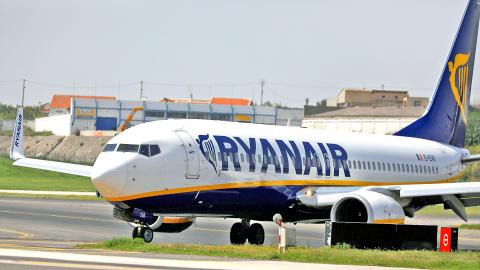Unions representing Ryanair cabin crew based in Spain, Portugal, Belgium and Italy on Monday said that they would go on strike this summer unless the low-cost airline accepts their demands by a June 30 deadline.
After a meeting in Madrid, the unions reiterated demands that Ryanair staff be employed according to the national legislation of the country they operate in, rather than that of Ireland as is currently the case, Spain’s USO union said in a statement.
They also asked that the airline give contractors the same work conditions as its own employees.

Photo: Reuters
Finally, they demanded that Ryanair recognize unions for pilots and cabin crew, and that it negotiate with a representative chosen by the unions.
So far, the airline has only recognized two unions — Britain’s BALPA pilots’ union and Italy’s ANPAC, which represents pilots and cabin crew.
“If Ryanair refuses to meet these demands, and setting June 30 as a deadline, the unions will start all necessary procedures to mobilize at a European level for the summer, including calling a strike,” USO said.
Antonio Escobar, from Spain’s SITCPLA union that represents part of Ryanair’s crew, said that another meeting would take place on July 3 and 4 in Dublin if the airline refuses to accede to their demands, in which they will announce a date for a strike.

Intel Corp chief executive officer Lip-Bu Tan (陳立武) is expected to meet with Taiwanese suppliers next month in conjunction with the opening of the Computex Taipei trade show, supply chain sources said on Monday. The visit, the first for Tan to Taiwan since assuming his new post last month, would be aimed at enhancing Intel’s ties with suppliers in Taiwan as he attempts to help turn around the struggling US chipmaker, the sources said. Tan is to hold a banquet to celebrate Intel’s 40-year presence in Taiwan before Computex opens on May 20 and invite dozens of Taiwanese suppliers to exchange views

Application-specific integrated circuit designer Faraday Technology Corp (智原) yesterday said that although revenue this quarter would decline 30 percent from last quarter, it retained its full-year forecast of revenue growth of 100 percent. The company attributed the quarterly drop to a slowdown in customers’ production of chips using Faraday’s advanced packaging technology. The company is still confident about its revenue growth this year, given its strong “design-win” — or the projects it won to help customers design their chips, Faraday president Steve Wang (王國雍) told an online earnings conference. “The design-win this year is better than we expected. We believe we will win

Chizuko Kimura has become the first female sushi chef in the world to win a Michelin star, fulfilling a promise she made to her dying husband to continue his legacy. The 54-year-old Japanese chef regained the Michelin star her late husband, Shunei Kimura, won three years ago for their Sushi Shunei restaurant in Paris. For Shunei Kimura, the star was a dream come true. However, the joy was short-lived. He died from cancer just three months later in June 2022. He was 65. The following year, the restaurant in the heart of Montmartre lost its star rating. Chizuko Kimura insisted that the new star is still down

While China’s leaders use their economic and political might to fight US President Donald Trump’s trade war “to the end,” its army of social media soldiers are embarking on a more humorous campaign online. Trump’s tariff blitz has seen Washington and Beijing impose eye-watering duties on imports from the other, fanning a standoff between the economic superpowers that has sparked global recession fears and sent markets into a tailspin. Trump says his policy is a response to years of being “ripped off” by other countries and aims to bring manufacturing to the US, forcing companies to employ US workers. However, China’s online warriors